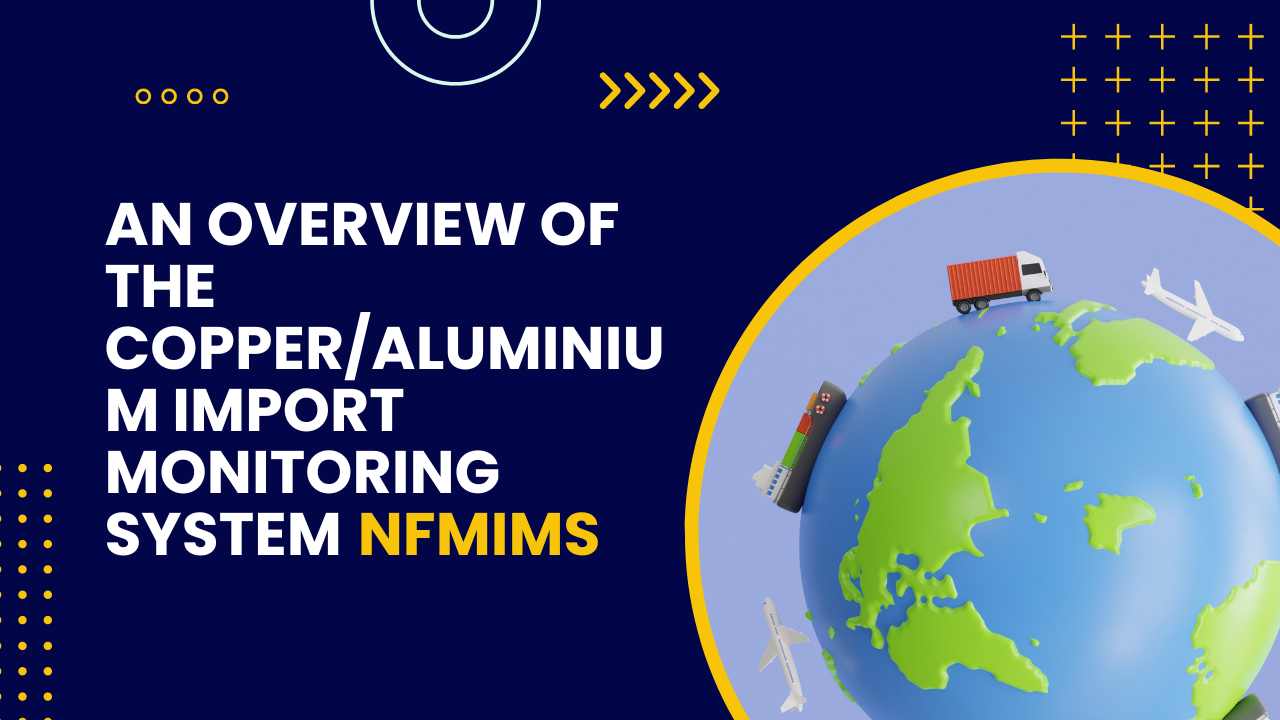In accordance with DGFT Notification No. 61/20152020, Dated March 31, 2021, the Indian government has changed the import laws pertaining to copper and aluminum under chapters 74 and 76 and mandated importers register with the Non-Ferrous Metals Import Monitoring System (NFMIMS).
Once the importer registers with NFMIMS they will be assigned a Unique Registration Number (URN) that starts with the initials “NFS.The registration must be finished no more than 60 days prior to the import cargo’s estimated arrival date and no later than 5 days following that date.Legal action, including action under the FTDR Act of 1992, will be taken against Copper/Aluminum importers who fail to register under NFMIMS in advance or who find that information provided in the online system is inaccurate.
Our goal at DCK Management Services is to be your one-stop shop for all import-export needs. Our timely assistance, first-rate direction, and regular updates show how dedicated we are to accomplishing this aim. These initiatives have made a big difference in our clients’ businesses’ faster growth.
In today’s global marketplace, the import and export of commodities play a crucial role in economic growth and stability. However, ensuring fair trade practices and monitoring the flow of goods is essential to prevent market disruptions and maintain a level playing field. One such mechanism employed by many countries is the Import Monitoring System (IMS), designed to track and regulate the importation of specific goods. In this blog post, we delve into the intricacies of the Copper/Aluminium Import Monitoring System NFMIMS, its significance, and how it functions.
Understanding NFMIMS
The NFMIMS, or the Copper/Aluminium Import Monitoring System, is a comprehensive framework established to monitor and regulate the importation of copper and aluminium products into a country. It serves as a mechanism to gather data on import activities, assess market trends, and ensure compliance with trade regulations. By scrutinizing the inflow of these crucial metals, governments can safeguard domestic industries, prevent circumvention of tariffs, and combat unfair trade practices.
Key Components
- Registration Process: Importers are required to register with the NFMIMS before engaging in the importation of copper or aluminium products. This registration process involves providing detailed information about the importer, such as company details, contact information, and intended import volumes.
- Data Reporting: Registered importers must regularly report detailed information on their import activities to the NFMIMS. This includes data on the type and quantity of imported products, country of origin, value, and other relevant documentation.
- Monitoring and Analysis: The NFMIMS utilizes advanced monitoring and analysis tools to track import trends, detect anomalies, and identify potential risks or irregularities in the importation of copper and aluminium products.
- Compliance Enforcement: In cases of non-compliance or suspicious activities, the NFMIMS has the authority to investigate and take appropriate enforcement actions, such as imposing penalties, conducting audits, or even restricting import privileges.
Significance of NFMIMS
The implementation of the Copper/Aluminium Import Monitoring System holds significant implications for various stakeholders:
- Government Authorities: NFMIMS enables government agencies to effectively regulate and oversee the importation of copper and aluminium products, thereby protecting domestic industries and ensuring fair trade practices.
- Domestic Industries: By monitoring import activities, NFMIMS helps safeguard domestic industries from unfair competition and dumping practices, thereby promoting growth and sustainability within the sector.
- Importers and Traders: While compliance with NFMIMS requirements may entail additional administrative burdens, it fosters transparency and accountability in import operations, reducing the risk of regulatory violations and associated penalties.
FREQUENTLY ASKED QUESTIONS
1. How do I register with NFMIMS?
To register with the NFMIMS, importers need to visit the official portal designated by the relevant government authority. The registration process typically involves filling out an online form and providing supporting documentation, such as business licenses and tax identification numbers.
2. Are all copper and aluminium products subject to NFMIMS regulations?
While the specific scope may vary depending on national regulations, NFMIMS generally covers a wide range of copper and aluminium products, including raw materials, semi-finished goods, and finished products.
3. What are the consequences of non-compliance with NFMIMS requirements?
Non-compliance with NFMIMS regulations can result in various penalties, including fines, suspension of import privileges, and legal repercussions. It is essential for importers to adhere to the prescribed procedures and reporting obligations to avoid such consequences.
Also Read: A Brief Overview of the Export License for SCOMET Items
Conclusion
In conclusion, the Copper/Aluminium Import Monitoring System NFMIMS plays a pivotal role in regulating the importation of these vital metals, ensuring transparency, fairness, and compliance in international trade. By fostering collaboration between government authorities, domestic industries, and importers, NFMIMS contributes to the stability and sustainability of the global trade ecosystem.
